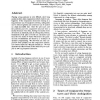Free Online Productivity Tools
i2Speak
i2Symbol
i2OCR
iTex2Img
iWeb2Print
iWeb2Shot
i2Type
iPdf2Split
iPdf2Merge
i2Bopomofo
i2Arabic
i2Style
i2Image
i2PDF
iLatex2Rtf
Sci2ools
101
click to vote
COLING
1992
1992
Dynamic Programming Method for Analyzing Conjunctive Structures in Japanese
Parsing a long sentence is very difficult, since long sentences often have conjunctions which result in ambiguities. If the conjunctive structures existing in a long sentence can be analyzed correctly, ambiguities can be reduced greatly and a sentence can be parsed in a high successful rate. Since the prior part and the posterior part of a conjunctive structure have a similar structure very often, finding two similar series of words is an essential point in solving this problem. Similarities of all pairs of words are calculated and then the two series of words which have the greatest sum of similarities are found by a technique of dynamic programming. We deal with not only conjunctive noun phrases, but also conjunctive predicative clauses created by "Renyoh chuushi-ho". We will illustrate the effectiveness of this method by the analysis of 180 long Japanese sentences.
Related Content
| Added | 07 Nov 2010 |
| Updated | 07 Nov 2010 |
| Type | Conference |
| Year | 1992 |
| Where | COLING |
| Authors | Sadao Kurohashi, Makoto Nagao |
Comments (0)

